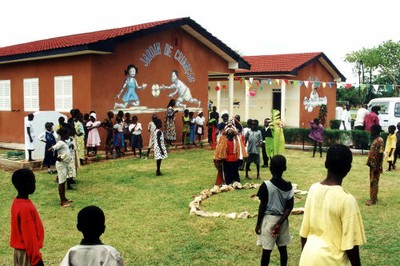SOS Schools in Guinea-Bissau
Less than 40 per cent of women in Guinea-Bassau are literate.
In Guinea-Bissau, there are currently four SOS Schools and three SOS Nurseries. These facilities provide education to children from SOS Villages and from the wider community. Staff members are well trained and the resources available to students are of a high standard. Below you can find an overview on the SOS Children education projects.
Alida's Story
Each year an NGO working on biodiversity invites school children
to the nature reserves of the Urok Islands in the Bijagos Archipelago.
Alida attends the SOS Technical Secondary School in Bissau and was one
of twelve lucky students to take the trip. It was the first time Alida
had been on a boat and she was amazed to see dolphins and sea turtles
swimming around them. “I really discovered the beauty of nature and the
natural wealth of my country,” she said.
Bissau : SOS Schools
The SOS Nursery at Bissau has around 100 children, most coming from the local community and a handful from our SOS village.
- The nursery consists of three group rooms, a Montessori classroom, a kitchen and a small office. The main subjects are language and mathematics and for any children with major learning difficulties, extra help is provided.
- Children take part in a wide range of community events. Recent events included a carnival parade organised by a local non-governmental organisation, International Children’s Day and African Child Day.
- The school has 12 classrooms, a laboratory, an office building, multi-purpose hall, library and school director’s house. The children are encouraged to work hard and the school expects to achieve success rates over 80% in end-year evaluations.
- As well as the academic learning, various extracurricular activities are organised throughout the year, including a school carnival, the celebration of special international days, as well as sports fixtures with other schools.
- The school consists of 12 classrooms, laboratories, administration rooms, a library and a multi-purpose hall. The school offers a General Study Course for children in the 7th to 9th grades and Technical Courses for those in the 10th and 11th grades. The school has links with public and private companies who help in the provision of certain training courses and there are also links with the Jean Piaget University.
- Students participate in a number of clubs and activities and the school takes part in special celebration days, such as National Environment Day.
Gabu : SOS Schools
The SOS Nursery at Gabu was opened in 2008 and has around 100 children, most coming from the local community and around 10 from our SOS village.
- There are four group rooms in the nursery, where children take part in a well-planned programme of structured activities, educational, social and recreational. Quarterly tests and the creation of individual child plans highlight where any extra support is needed for learning.
- Most of the children speak the local dialect (Falani) and as well as learning French, they also enjoy being introduced to foreign languages.
The SOS Primary School at Gabu has between 200-400 students and consists of six classrooms, as well as a hall, library, administrative block and school director’s house.
- In terms of educational attainments, most students pass their tests, with only around 5% showing poor grades, perhaps due to family circumstances.
- Various clubs and recreational activities are held outside of lessons and the school participates in national and international celebration days.
 Canchungo : SOS Schools
Canchungo : SOS Schools
The SOS Nursery at Canchungo has around 100 children, most coming from the local community and around 20-30 from our SOS village.
- There are four group rooms in the nursery, where children take part in educational, social and play activities. A child development plan is completed for each child to assess their progress in different areas of learning.
- Inspired by the African Charter on the rights and welfare of children, the nursery carries out various awareness campaigns through the year and holds meetings on child protection issues for parents and guardians.
The SOS Primary School at Canchungo has around 200 students, normally with over thirty from the SOS village. The school has six classrooms, a hall and administration area.
- Most students (between 70-85%) pass their end year tests. The school tries to keep failure and drop-out rates to a minimum, though problems can be due to the long distances some children have to travel to reach the school or to health problems.
- During the year students are taken on trips to see local historical sites or to visit other non-governmental organisations in the region.

 Return to Schools Wikipedia Home page…
Return to Schools Wikipedia Home page…
